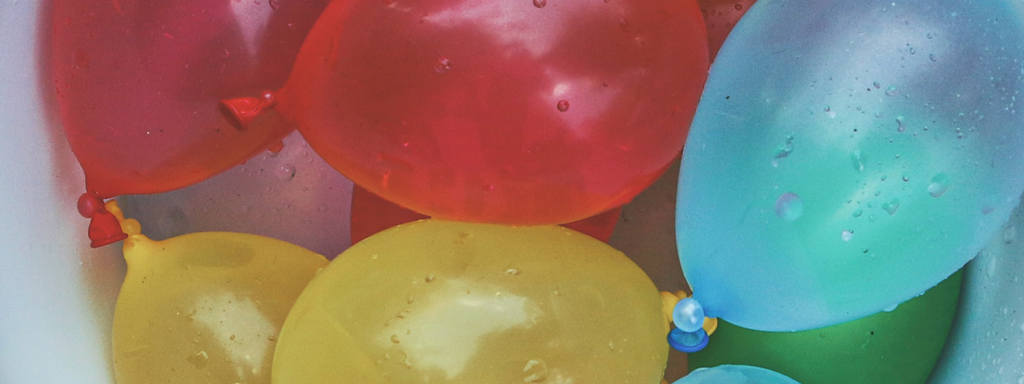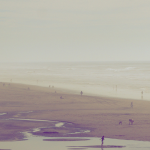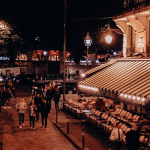Wearing white is like carving a bullseye on our bodies, inviting men to spray us just so they can peek at our nipples or the floral etches of our bras, which means the first rule is never to wear white, light pink, or the soft yellow of newborn chicks. While it’s better to steal one of our brother’s vintage-whatever-concert t-shirts, we don’t want to be confused for tomboys. We still wear our own shorts and tank tops, as long as we don’t mind that these clothes might become trash after the hoopla, since there’s a chance they’ll be stained by ink or foam or mud water, or, although we hope not—drain water and piss. Another rule is that we ignore babies, toddlers, people in wheelchairs, and the elderly. Everyone else is game. The third is under no circumstances do we leave our homes in sandals. Sandals provide no traction even when dry, and once soaked—forget it—the soles of our feet will swipe on the plastic as if slipping on a shiny oil puddle, and one of us will find ourselves on the ground, maybe bleeding, narrowly avoiding a stray dog’s mound of dung a foot from our head. By then everyone will pile water balloons and spray Carioca foam until whoever is on the floor looks like a monster that sheds mounds of shaving cream, the smell of dish soap and faint lavender living on their skin until a shower purges it along with the town’s dirt. This introduces the last rule: always cover your face when you become a target. Close your eyes, shut your mouth, use your hands to cup your nose. Because we’re fifteen, sixteen, the yearly water fights during Carnival are still fun, and my mother begrudgingly lets me go—as the five of us leave with water balloons and foam cans to roam the streets—and tells us to be careful with the salvajes. The savages. You’d think everyone would be out and about in parades the way Brazilians do, but we don’t celebrate with dances, we celebrate with water wars. Most stay at home so they don’t get wet. But getting wet is the least of it. They stay home to avoid water balloons’ harsh pop of plastic on their bodies. People save up for taxis to prevent getting stained by green ink more radiant than a lizard’s viridescent skin. Some get hurt. A friend almost loses an eye one year when a balloon strikes her face as she’s sitting in a moving bus, the window open just wide enough to ruin her day. Cyclists get clobbered and collide into jaywalkers, causing a domino effect of gasps and gossip. We know people can be savages, but we’re kids and all we want to do is have fun. At first, this is just what happens. A bucket of water from a second floor drenches us, and we dash to a safe corner while saving our balloons for easy targets. Many of the businesses are closed, and the often bike-packed streets have been replaced by taxis that don’t honk to see if we need a ride since we’re dirty and wet. I hear laughter, got you! screams, kids playing with their parents, girls faking anger when dowsed, boys shouting mójala mójala up and down the streets. We stay close, change our trajectory when a large group of men think we can’t see their hidden garden hose. After some blocks, we have no more balloons, just enough foam to douse barefoot preteens. We fix each other’s runaway hairs, shout when we’re about to be bombarded, and wipe the stained mascara from our cheeks. With fingertips soggy, we make our way to a side street where there’s just a group of kids playing amongst themselves, too focused on their own battle to pay attention to us. We let our guard down, planning the rest of the path, wondering if we need to head to someone’s home to rest and get more foam. I look up toward windows, to the crooks of where walls meet doors, in case someone is waiting to surprise us with a water gun. But I ignore the car speeding on the street while we stroll on the walkway. It’s just a driver—no passenger and no windows down. But it’s too late once I realize what’s happening, and we all shove each other to where our instincts deem is safer, trying to make ourselves small. At first I assume he loses control, but the car halts a foot from us, our hands grabbing another’s arms, a chain of linked teenage girls with clothes soaked, skin slimy and damp swarming with goosebumps—not from the water but the fright. He gets out with half the car on the sidewalk, the other half on the street, and glances at us and laughs and laughs and laughs as he strides to a house, moving as quick and slow as watching a water balloon being flung from across the street. My friends shout, call him an animal, a pendejo, while I pull them away in case he races back to do more than a feint. I get a sudden urge to bathe, remove the trail of grime on my neck and the dyes on my skin that I haven’t yet seen. Everything feels wrong, as if I know my hair is in disarray, as if I should have stayed dry at home and not sacrificed my least favorite shirt, and I look at my knobby knees and wonder why he wanted to scare us. When we amble to the end of the block—pops of burst pastel plastic littering the pavement—I feel as if we’re too grown, maybe not in mind but in bodies, to be playing this game.
…
Biography
Victoria Buitron is a writer and translator with an MFA in Creative Nonfiction from Fairfield University. Her work has been featured or is upcoming in The Citron Review, Bending Genres, Lost Balloon, and other literary magazines.
Image: unsplash.com





